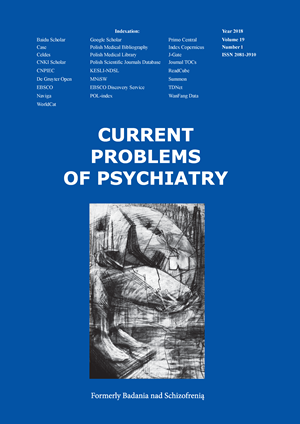Executive functions and memory in patients at risk of vascular brain pathology
DOI:
https://doi.org/10.1515/cpp-2018-0005Keywords:
executive function, verbal learning, hypertensionAbstract
Hypertension is a common problem in the elderly population. It is one of the factors determining the pattern of cognitive functioning of the patients, however the nature and severity of neuropsychological deficits are unclear. The main aim of the study was to assess effectiveness of cognitive task performance and the strategies of verbal material organization in patients with varying levels of productivity and control. The outpatients treated for hypertension (n = 46) were tested with the following neuropsychological tests and the experimental task: Ruff Figural Fluency Test (RFFT), California Verbal Learning Test (CVLT), Semantic Verbal Fluency Task (VF). The level of productivity and control in older hypertensive patients appeared to be important variables differentiating the effectiveness of structured task performance involving the memory and learning of verbal material. Patients with weaker productivity and control show less efficiency in formulating and sustaining a learning plan expressed by the compatibility of responses in subsequent attempts. Weaker productivity and control are associated with high risk of memory problems, especially in situations characterized by a high degree of structure. It is advisable to include an evaluation of certain aspects of executive functions at the initial stage of assessment of patients at risk of brain dysfunction.
References
1. Kilander L., Nyman H., Boberg M., Hansson L., Lithell H.Hypertension is related to cognitive impairment: A 20-year followup of 999 men. Hypertension, 1998; 31: 780-786.
2. Raz N., Rodrigue K.M., Kennedy K.M., Acker J.D. Vascular health and longitudinal changes in brain and cognition in middle-aged and older adults. Neuropsychology, 2007; 21(2): 149-157.
3. Gottesman R.F., Schneider A.L.C., Albert M., Alonso A., Bandeen- Roche K., Coker L., Mosley T.H. Midlife hypertension and 20-year cognitive change: The atherosclerosis risk in communities neurocognitive study. JAMA Neurol, 2014; 71: 1218-1227.
4. Saxby B.K., Harrington F., McKeith I.G., Wesnes K., Ford G.A. Effects of hypertension on attention, memory, and execution function in older adults. Health Psychol, 2003; 22(6): 587-591.
5. Thorvaldsson V., Skoog I., Hofer S.M., Börjesson-Hanson A., Östling S., Sacuiu S., Johansson B. Nonlinear blood pressure effects on cognition in old age: separating between-person and withinperson associations. Psychol Aging, 2012; 27(2): 375-383.
6. Kelly A., Calamia M., Koval A., Terrera G.M., Piccinin A.M., Clouston S., Hassing L.B., Bennett D.A., Johansson B., Hofer S.M. Independent and interactive impact of hypertension and diabetes mellitus on verbal memory: A coordinated analysis of longitudinal data from England, Sweden, and the United States. Psychol Aging, 2016; 31( 3): 262-273.
7. Kalra L., Jackson S.H., Swift C.G. Effect of antihypertensive treatment on psychomotor performance in the elderly. J Hum Hypertens, 1993; 7(3): 285-290.
8. Waldstein S.R., Katzel L.J. Hypertension and cognitive function. W: Waldstein S.R., Elias M.F. eds., Neuropsychology of cardiovascular disease. Mahwah NJ; Erlbaum: 2001, pp. 15-36.
9. Kennelly S., Collins O. Walking the cognitive “minefield” between high and low blood pressure. J Alz Dis, 2012; 32: 609-621.
10. Jaiswal A., Bhavsar V., Jaykaran, Kantharia, Effect of antihypertensive therapy on cognitive functions of patients with hypertension. Annals of Indian Academy of Neurology, 2010; 13(3): 180-184.
11. Bădilă E., Tintea E., Bartos D. Arterial Hypertension and Cognitive Decline. Is it More than Pure Coincidence? Mod Med, 2015; 22(3): 269-276.
12. Brookes R.L., Hannesdottir K., Markus H.S., Morris R.G. Lack of awareness of neuropsychological deficit in cerebral small vessel disease: The relationship with executive and episodic memory functions. Journal of Neuropsychology, 2013; 7: 19-28.
13. Bäckman L., Jones S., Berger A.K., Laukka E.J., Small B.J. Multiple cognitive deficits during the transition to Alzheimer’s disease. J Intern Med, 2004; 256: 195-204.
14. Aretouli E., Tsilidis K.K., Brandt J. Four-year outcome of mild cognitive impairment: The contribution of executive dysfunction. Neuropsychology, 2013; 27: 95-106.
15. Lezak M.D. Neuropsychological assessment (Third Edition). New York; Oxford University Press: 1995.
16. Ortega A., Gómez-Ariza C.J., Roman P., Bajo M.T. Memory inhibition, aging, and the executive deficit hypothesis. J Exp Psychol Learn Mem Cogn, 2012; 38(1): 178-186.
17. Jodzio K. Neuropsychologia intencjonalnego działania. Koncepcje funkcji wykonawczych. Warszawa; Wydawnictwo Naukowe SCHOLAR: 2008.
18. Bouazzaoui B., Angel L., Fay S., Taconnat L., Charlotte F., Isingrini M. Does the greater involvement of executive control in memory with age act as a compensatory mechanism? Can J Exp Psychol, 2014; 68(1): 50-66.
19. Łojek E., Stańczak J. Test Płynności Figuralnej Ruffa RFFT. Polska standaryzacja i normalizacja. Podręcznik. Warszawa; Pracownia Testów Psychologicznych PTP: 2005.
20. Zawadzka E., Domańska Ł. Strategie wykonania zadań płynności werbalnej i figuralnej u osób po udarze mózgu. Studia Psychologiczne, 2010; 49(1): 95-108.
21. Łojek, E., Stańczak, J. Podręcznik do Kalifornijskiego Testu Uczenia się Językowego CVLT. Polska normalizacja. Warszawa; Pracownia Testów Psychologicznych PTP: 2010.
Downloads
Published
Issue
Section
License
Copyright (c) 2018 Authors

This work is licensed under a Creative Commons Attribution-NonCommercial-NoDerivatives 3.0 Unported License.


